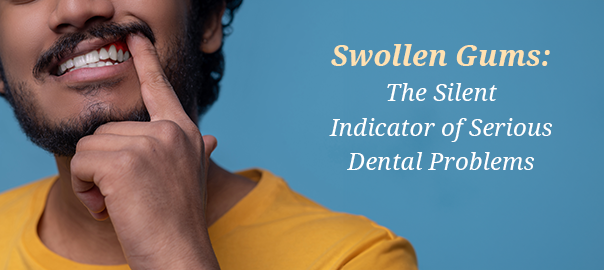
Swollen Gums: The Silent Indicator of Serious Dental Problems
Have you noticed redness around your gums while smiling? Or have there been occasional red streaks while brushing? One of our patient’s most common questions is, “Why is my gum swollen around one tooth in the back?” This question’s growing popularity led us to discuss this, as it needs our special attention.
While being the most common oral health issue, gum swelling also tends to be the earliest warning sign asking for attention towards oral health. We at Clove believe the sooner you understand the signs to look out for, the faster you can act upon it.
Keep reading to explore the various causes, implications, and treatment approaches for swollen gums.
Understanding Gum Inflammation: The Basics
Gum inflammation, or gingivitis, represents the body’s natural response to irritants or infection in the oral cavity. This condition manifests through:
- Redness and tenderness of the gum tissue
- Noticeable swelling around specific teeth
- Increased sensitivity during brushing or flossing
- Occasional bleeding, particularly during oral hygiene routines
Primary Causes of Localized Gum Swelling
Food Debris and Poor Oral Hygiene
Trapped food particles between teeth or along the gum line, end up creating a zone that is ideal for bacterial growth. This when combined with improper oral hygiene maintenance leads to plaque formation. Over time, this plaque deposit starts to inflame its surrounding areas, leading to redness and potential infection if left further untreated.
Periodontal Disease Progression
Periodontal disease develops in stages, beginning with gingivitis and potentially progressing to periodontitis. In its early stages, the condition causes gum inflammation and bleeding. As it advances, patients may experience:
- Gum recession
- Formation of periodontal pockets
- Bone loss around affected teeth
- Tooth mobility in severe cases
Dental Abscess Formation
A dental abscess represents a severe condition where bacteria invade the tooth’s pulpal tissue or surrounding structures. This infection manifests as:
- Intense, throbbing pain
- Significant swelling around the affected tooth
- Sensitivity to temperature changes
- Possible facial swelling in advanced cases
Wisdom Teeth: A Special Consideration
Wisdom teeth often present unique challenges regarding gum swelling, particularly when asking, “Why is my gum swollen around one tooth in the back?” The third molars, or wisdom teeth, frequently cause inflammation due to:
Pericoronitis
This condition occurs when wisdom teeth partially emerge, creating a flap of gum tissue that traps food debris and bacteria. The resulting inflammation can cause significant discomfort and swelling in the posterior oral cavity.
Impaction Issues
Impacted wisdom teeth may press against adjacent structures, leading to:
- Localized inflammation
- Pressure pain
- Difficulty maintaining proper oral hygiene
- Increased risk of infection
Professional Intervention and Treatment
When experiencing persistent gum swelling, professional dental evaluation becomes crucial. Treatment approaches vary based on the underlying cause:
Conservative Management
For mild cases, treatment may involve:
- Professional dental cleaning
- Improved oral hygiene instruction
- Antimicrobial mouth rinses
- Regular monitoring
Advanced Interventions
More severe cases might require:
- Periodontal scaling and root planing
- Antibiotic therapy
- Surgical intervention for wisdom teeth
- Drainage of abscesses when present
Prevention and Maintenance
Maintaining optimal oral health requires consistent attention to:
- Regular dental hygiene practices
- Proper brushing and flossing techniques
- Professional dental examinations
- Early intervention when problems arise
Understanding gum swelling’s significance as a potential indicator of dental issues enables patients to seek appropriate care promptly. Whether dealing with routine inflammation or more complex wisdom tooth complications, professional dental evaluation remains essential for optimal oral health maintenance.
Leave a Reply
Leave a Reply
Explore More Similar Posts
Explore More Blogs


Leave a Reply